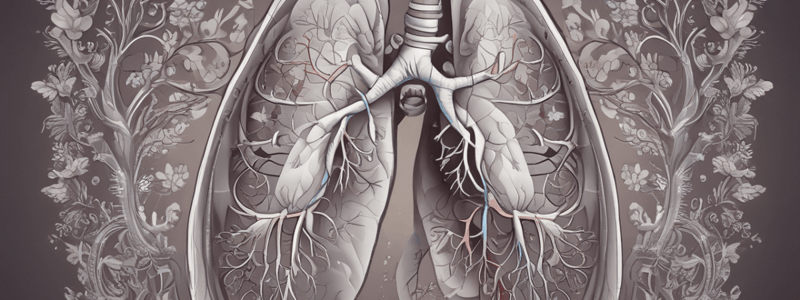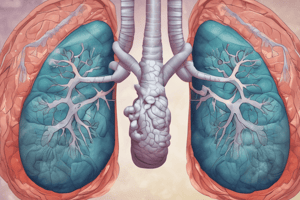Podcast
Questions and Answers
What is a collection of air in the chest around the lungs, which may cause atelectasis?
What is a collection of air in the chest around the lungs, which may cause atelectasis?
- Pulmonary edema
- Pneumothorax (correct)
- Pulmonary embolism
- SARS
Which condition occurs when heart function declines and fluid fills spaces of the lungs?
Which condition occurs when heart function declines and fluid fills spaces of the lungs?
- TB
- Pulmonary embolism
- Pneumothorax
- Pulmonary edema (correct)
What is a blocked artery in the lungs, often caused by immobility?
What is a blocked artery in the lungs, often caused by immobility?
- Pneumothorax
- Pulmonary embolism (correct)
- Pulmonary edema
- Sinusitis
What is a relatively new respiratory disease caused by a virus that is very contagious and sometimes fatal?
What is a relatively new respiratory disease caused by a virus that is very contagious and sometimes fatal?
What is the medical term for a hypersensitivity reaction to various airborne allergens?
What is the medical term for a hypersensitivity reaction to various airborne allergens?
What is decreased by positioning a baby on its back for sleep?
What is decreased by positioning a baby on its back for sleep?
What is the name of the cartilage that forms most of the posterior wall of the larynx and a small part of the anterior wall?
What is the name of the cartilage that forms most of the posterior wall of the larynx and a small part of the anterior wall?
What is caused by smoking or exposure to radon, asbestos, or industrial carcinogens?
What is caused by smoking or exposure to radon, asbestos, or industrial carcinogens?
What is the medical term for difficulty breathing?
What is the medical term for difficulty breathing?
Which condition is not caused by cigarette smoking?
Which condition is not caused by cigarette smoking?
Which of the following is not a form of pneumoconiosis?
Which of the following is not a form of pneumoconiosis?
What is the term for a collapsed lung?
What is the term for a collapsed lung?
What is the term for coughing up blood?
What is the term for coughing up blood?
What is the term for inadequate oxygenation of the cells?
What is the term for inadequate oxygenation of the cells?
What is the term for breathing rapidly and deeply, which decreases the amount of carbon dioxide in the blood?
What is the term for breathing rapidly and deeply, which decreases the amount of carbon dioxide in the blood?
What is the term for a pleural effusion caused by an infective process that results in a pus buildup?
What is the term for a pleural effusion caused by an infective process that results in a pus buildup?
What is the flap-like structure that closes off the larynx during swallowing?
What is the flap-like structure that closes off the larynx during swallowing?
What is the gas that is essential for human life?
What is the gas that is essential for human life?
Which type of nonspecific body defense prevents pathogens from entering the body?
Which type of nonspecific body defense prevents pathogens from entering the body?
What is the primary function of phagocytosis?
What is the primary function of phagocytosis?
How does an individual develop a naturally acquired active immunity?
How does an individual develop a naturally acquired active immunity?
What is the best response to Cherise's question about the potential health effects of spleen removal?
What is the best response to Cherise's question about the potential health effects of spleen removal?
What is the result of inflammation in response to an injury?
What is the result of inflammation in response to an injury?
Which nonspecific body defense utilizes enzymes in body fluids to destroy pathogens?
Which nonspecific body defense utilizes enzymes in body fluids to destroy pathogens?
What type of immune cells become plasma cells in response to an antigen?
What type of immune cells become plasma cells in response to an antigen?
What is the nonspecific body defense in which neutrophils and monocytes can leave the bloodstream to attack pathogens in other tissues?
What is the nonspecific body defense in which neutrophils and monocytes can leave the bloodstream to attack pathogens in other tissues?
Which type of immune cells directly attack cells with antigens?
Which type of immune cells directly attack cells with antigens?
What type of nonspecific body defense does interferon in the blood act as?
What type of nonspecific body defense does interferon in the blood act as?
What type of immune response involves the production of memory cells?
What type of immune response involves the production of memory cells?
Which organ is responsible for filtering the blood and storing platelets and white blood cells?
Which organ is responsible for filtering the blood and storing platelets and white blood cells?
What is the primary function of T cells?
What is the primary function of T cells?
What type of immune cells produce cytokines?
What type of immune cells produce cytokines?
Which of the following increase B cell production and stimulate red bone marrow to produce more WBCs?
Which of the following increase B cell production and stimulate red bone marrow to produce more WBCs?
Which type of immune cell secretes lymphokines?
Which type of immune cell secretes lymphokines?
Which type of immune cell targets cancer cells?
Which type of immune cell targets cancer cells?
What is unique to an individual and present on every cell in that person's body, and activates T cells?
What is unique to an individual and present on every cell in that person's body, and activates T cells?
Which immune cells secrete chemicals that produce holes in the membranes of harmful cells but do not have to recognize a specific antigen to start destroying pathogens?
Which immune cells secrete chemicals that produce holes in the membranes of harmful cells but do not have to recognize a specific antigen to start destroying pathogens?
Which type of activated T cell is active against viruses and protects the body against cancer?
Which type of activated T cell is active against viruses and protects the body against cancer?
Which type of activated T cell prevents a person from having the same disease twice?
Which type of activated T cell prevents a person from having the same disease twice?
Which type of activated T cell increases phagocytosis and antibody formation?
Which type of activated T cell increases phagocytosis and antibody formation?
Flashcards are hidden until you start studying
Study Notes
Respiratory System
- Atelectasis: a collection of air in the chest around the lungs, which may cause atelectasis.
- Pulmonary edema: fluid buildup in the lungs due to heart function decline.
- Pulmonary embolism: a blocked artery in the lungs, often caused by immobility.
- SARS: a relatively new respiratory disease caused by a contagious and sometimes fatal virus.
- SIDS: sudden infant death syndrome, decreased by sleeping on the back.
Respiratory Diseases
- Lung cancer: caused by smoking or exposure to radon, asbestos, or industrial carcinogens.
- Emphysema: a lung disease caused by smoking or exposure to environmental or occupational dust.
- Pneumoconiosis: a lung disease caused by years of exposure to different environmental or occupational types of dust.
- Rhinitis: allergic hypersensitivity reaction to various airborne allergens.
- Coryza: another name for an upper respiratory tract infection (URI) or the common cold.
Anatomy and Physiology
- Cricoid cartilage: forms most of the posterior wall of the larynx and a small part of the anterior wall.
- Epiglottis: the flap-like structure that closes off the larynx during swallowing.
- Larynx: formed by three carriages: the thyroid cartilage, epiglottis cartilage, and cricoid cartilage.
Symptoms and Conditions
- Dyspnea: difficulty breathing.
- Diaphoresis: excessive perspiration.
- Hemoptysis: coughing up blood.
- Hyperventilation: rapid and deep breathing that decreases carbon dioxide in the blood.
- Hemothorax: blood in the pleural cavity.
- Hydrothorax: dry fluid in the pleural cavity.
- Empyema: pus buildup in the pleural cavity due to infection.
Immunity
- Active immunity: developed through exposure to disease-causing organisms or vaccination.
- Passive immunity: temporary immunity through antibodies from another source, such as a mother or vaccine.
- Nonspecific body defenses: mechanical barriers, chemical barriers, inflammation, and phagocytosis.
- Specific body defenses: T cells and B cells.
White Blood Cells
- WBCs involved in specific defenses: T cells and B cells.
- T cells: bind to antigens on cells and attack them directly.
- B cells: produce antibodies against specific antigens.
- Natural killer (NK) cells: target cancer cells and produce holes in the membranes of harmful cells.
- Macrophages: engulf and digest foreign particles and microorganisms.
Immune System
- Major histocompatibility complex (MHC): unique to an individual, present on every cell, and activates T cells.
- Cytokines: chemical signals that activate immune responses.
- Complements: proteins that help eliminate pathogens from the body.
- Lymphokines: chemicals produced by T cells that stimulate immune responses.
Studying That Suits You
Use AI to generate personalized quizzes and flashcards to suit your learning preferences.




